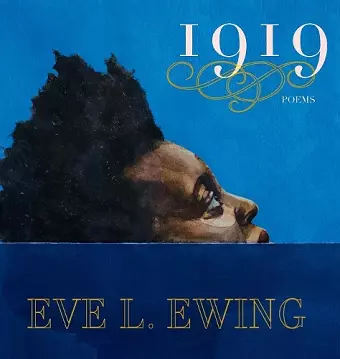1919
Format:Hardback
Publisher:Haymarket Books
Published:25th Jul '19
Currently unavailable, and unfortunately no date known when it will be back

Galleys available 20,000 copy print run Co-op available CBSD galley box National TV, radio, and print campaign, including interviews, features, and reviews Review copies sent to major dailies like New York Times, Chicago Tribune, etc. as well as online, Black interest, and poetry outlets like Poetry Magazine, Poets & Writers, Ebony, Jet, Blavity, Buzzfeed, Mic, and others. Major launch events in Chicago, Boston, and New York City Features in Chicago Magazine, Chicago Reader, Chicago Tribune, South Side Weekly Feature interview on WBEZ Chicago Public Radio and performance on PBS affiliate WTTW's "Chicago Tonight", pitches to local afternoon news outlets which Ewing has been on in the past Advertising in Poets and Writers, Poetry, Kenyon Review Promotion at the 2019 Association of Writers & Writing Programs conference Direct promotion to public school teachers in Chicago and beyond, with ebook giveaway, high school reading guide, teacher open-mic, and more Submission to poetry awards Publicity and promotion in conjunction with the author's speaking engagements Promotion through social media: Eve Ewing 162k Twitter followers, and 10k Instagram followers, Haymarket Books has 40k Twitter followers and 48k Facebook fans Promotion on the author's website www.eveewing.com
Poetic reflections on race, class, violence, segregation, and the hidden histories that shape our divided urban landscapes.
“The Zora Neale Hurston of her generation.” —Studio 360
“A truly rare cultural phenomenon: an artist who not only holds up a mirror to society, but makes herself a catalyst to change it.” —Chicago Tribune
The Chicago Race Riot of 1919, the most intense of the riots that comprised the “Red Summer” of violence across the nation’s cities, is an event that has shaped the last century but is widely unknown. In 1919, award-winning poet Eve L. Ewing explores the story of this event—which lasted eight days and resulted in thirty-eight deaths and almost 500 injuries—through poems recounting the stories of everyday people trying to survive and thrive in the city. Ewing uses speculative and Afrofuturist lenses to recast history, and illuminates the thin line between the past and the present.
Eve L. Ewing is a writer and an assistant professor at the University of Chicago School of Social Service Administration. She is the author of Electric Arches and Ghosts in the Schoolyard: Racism and School Closings on Chicago’s South Side.
O Magazine Best Books by Women of Summer 2019
Chicago Tribune 25 hot books of summer 2019
The Millions Must-Read Poetry of June 2019
LitHub Most Anticipated Reads of Summer 2019
Buzzfeed 29 Summer Books To Get Excited About
Chicago Review of Books Best New Books of June 2019
“The genre-busting poet/scholar behind Electric Arches and Ghosts in the Schoolyard combines assiduously researched facts and bracing lyricism in this elegiac exploration of the 1919 Chicago race riot and the “summer-song folk” who were its human cost.”
—O Magazine
“Eve Ewing is a poet of limitless possibility. She seems to get sharper and more daring with each book.”
—Poetry Magazine
“A mixture of grand voices, hushed laments, and ardent dreams, 1919 resurrects forgotten history.”
—The Millions
“Following the publication of Ghosts in the Schoolyard: Racism and School Closings on Chicago’s South Side, respected writer and scholar Eve L. Ewing homes in on another critical moment in the city’s history: the Chicago Race Riot of 1919. In a new series of poems, she delves into this little-known event — lasting eight days and resulting in 38 deaths and nearly 500 injuries — and its reverberations over the last century.”
—Chicago Tribune
“These clarion and haunting poems—some psalm-like, others percussive, even concussive, all technically brilliant and sure to galvanize adults and teens alike—incisively and resoundingly evoke the promise and betrayal of the Great Migration and the everyday struggles of Chicago’s Black community against vicious and violent racism. The riot a century ago, Ewing writes, “left an indelible mark on the city,” which she gracefully, imaginatively, and searingly illuminates with hope for a more just future.”
—Booklist Starred Review
“The poems in 1919 ask how far we’ve come, and question ideas of progress and of thriving and surviving. On the centenary of the Red Summer, in an America hardly less violent and anti-black, Ewing wields a kaleidoscopic Afrofuturist style to illuminate a crucial piece of history and to imagine a path forward.”
—LitHub
“Ewing blends past, present, and future, imagining the stories of those who lived through the riot and beyond, and inquiring into its lasting consequences.”
—Buzzfeed
“Flecked with historical photos and evocative quotes from a post-riot commission report, filled with biblical and mythological references, seamlessly bending time and genre, 1919 is an unforgettable conversation-starter. Every poem leaves a bruise.”
—Longreads
“Eve Ewing’s 1919 is a window into the mental and emotional lives of Black Americans in a Chicago, in an America, where time beckons oppressively. Exodus and deliverance to a promised land? The eternal return of racist violence? Time lends haunted hope. Maybe circular time, the eternal return, could cease and turn linear, toward exodus and deliverance. 1919 places readers in the minds and bodies of Black Chicagoans, Black Americans, and asks readers to see what has been, and what could be.”
—Vice
“These poems are crafted and tense, inventive and full of energy.”
—The Rumpus
“We can’t recommend this book highly enough.”
—Zinn Education Project
“Equal parts poetry collection and sweeping historical narrative, 1919 has the feel of an instant classic.”
—Danny Caine, Raven Bookstore
ISBN: 9781608466023
Dimensions: unknown
Weight: unknown
88 pages